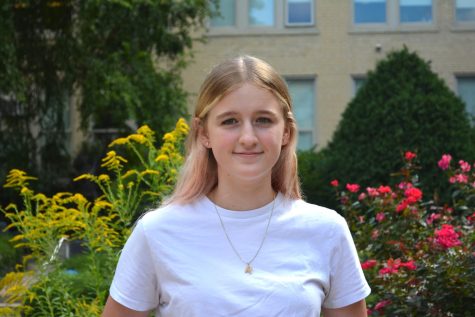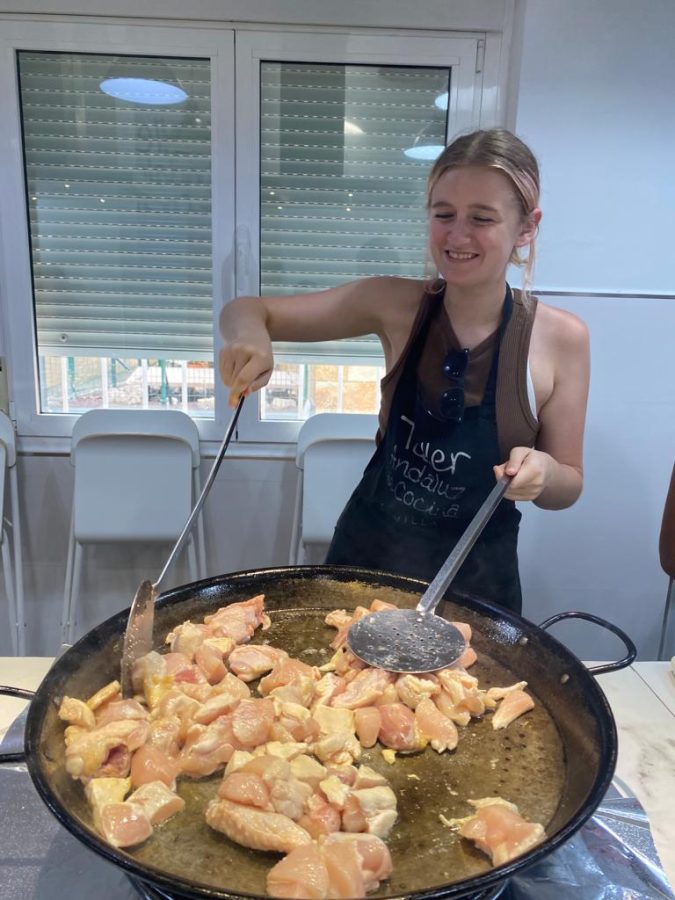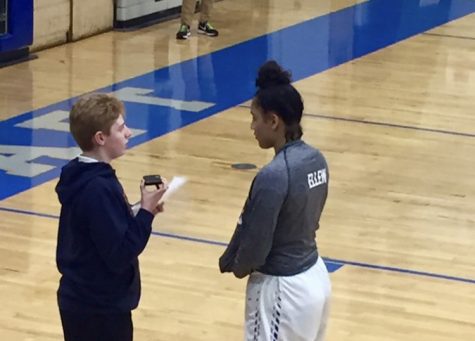¡Qué Guay!: My enriching experience studying abroad in Spain
Ruby Thomspon attending a cooking class as part of a CIEE excursion.
Standing in line at a clothing store in La Plaza Nervión, my eyes dart to the translation app on my phone, trying to memorize the phrase, “When is the summer sale going to end?”
After 20 minutes in line, it’s my turn and I greet the cashier. She bags my item, and then I blurt out the question I’ve been repeating in my head over and over. She replies “August,” with some other words that fly over my head.
I think, “OK, that wasn’t too bad. I should try asking some kind of follow up question, practice conversing, etc.” I ask her in Spanish if it was a special sale or something like that. She rattles off a lengthy answer that for all I know, could have been about another sale approaching, the store closing or that she was losing her job. I just nodded and hoped my face didn’t scream, “I have absolutely no idea what you just said.”
That was during my first week studying abroad in Seville, Spain, through the Council on International Educational Exchange (CIEE). Every day after Spanish classes in the morning, we were tasked with various kinds of “missions,” where we had to go up to locals in the street and in stores and strike up a conversation about whatever prompt we had been given.
I have to admit, the first week of doing this was quite unpleasant for me, as I find it difficult to approach strangers in public in general, let alone in a language I could barely understand. However, by the third week, I was grateful that I was being forced to do it every day.
For anyone considering whether or not it would be worth it to study abroad next summer, I would tell you that one of the most important benefits that I got from my experience, which I could not get in the classroom, was the ability to use the language comfortably. What I don’t mean is that staying there made me 100% fluent, as it was only a one month trip, but what I do mean is that I felt less scared to speak in Spanish and make mistakes.
Every day, you take a class taught in Spanish for three hours and you can only talk to the teacher in Spanish. Every day, you go out into the city and have conversations with locals in Spanish. Every day, you go home to your host family and speak to them in Spanish. You have plenty of opportunities to speak in the language and almost don’t have a choice but to put yourself out there and try to communicate. Because of this, my reluctance to speak — the fear I had of making a mistake or not being able to be understood — faded fairly quickly.
This was also in part because very early on, it was explained to me that even if you make some kind of mistake with grammar or conjugation, most of the time people will still understand what you are trying to say. If you don’t know how to say a word or a phrase, you are also taught to develop strategies to explain what you want to say differently. This helps you both expand your vocabulary and change your mindset; instead of not speaking when you don’t know the words, you learn to find alternative ways to speak
Another upside to studying abroad was the experience of staying with a local family. Everyone in the program is placed in a homestay that’s at most a 30-minute walk from the school where morning classes are held, and you are expected to eat three meals a day at home. My host family consisted of just one older woman, who had lived in Andalucia (a region of Sevilla) all her life. While I didn’t always completely grasp what she was trying to say to me, she was patient and understanding, willing to repeat herself slower or explain something in a way that was easier to understand. I was very grateful to have someone familiar to converse with in Spanish, as my conversations with strangers could sometimes be difficult to maintain or just plain awkward. I went from nodding in affirmation to having conversations with her about what we were watching on TV or what I had done in class that day. CIEE also gave us daily questions or topics to ask our host families about as an assignment, which made conversing easier.
With classes, trips to Granada and Cadiz and room and board, the program was not inexpensive. However, CIEE did offer scholarships that you could apply for. If awarded one, the merit-based scholarships covered 10% of the tuition cost, while the merit and financial need-based scholarships could cover up to 100% of the cost. We didn’t have to pay for meals unless we wanted to eat out, as our host families provided us with three meals a day. Everyone was also given a public transportation card with 30 euros for the month.
During the final week of my study abroad, I walked into a bookstore a few minutes away from my house. After browsing through the store, I went up to pay for a book and start talking to the cashier. I talked to him about how I hadn’t seen this book available in English, and he told me that it’s only out in Spanish, and that that volume had only come out four days ago. It’s simply small talk, a routine everyday conversation, but it also marked significant change in my relationship with Spanish compared to when I first arrived in Seville.
Your donations directly fund the Lane Tech student journalism program—covering essential costs like website hosting and technology not supported by our school or district. Your generosity empowers our student reporters to investigate, write, and publish impactful stories that matter to our school community.
This website is more than a publishing platform—it's an archive, a research tool, and a source of truth. Every dollar helps us preserve and grow this resource so future students can learn from and build on the work being done today.
Thank you for supporting the next generation of journalists at Lane Tech College Prep!

Ruby Thompson is a senior in her second year with The Champion. She can often be seen taking photos on the sidelines during Lane sports games, and she...





